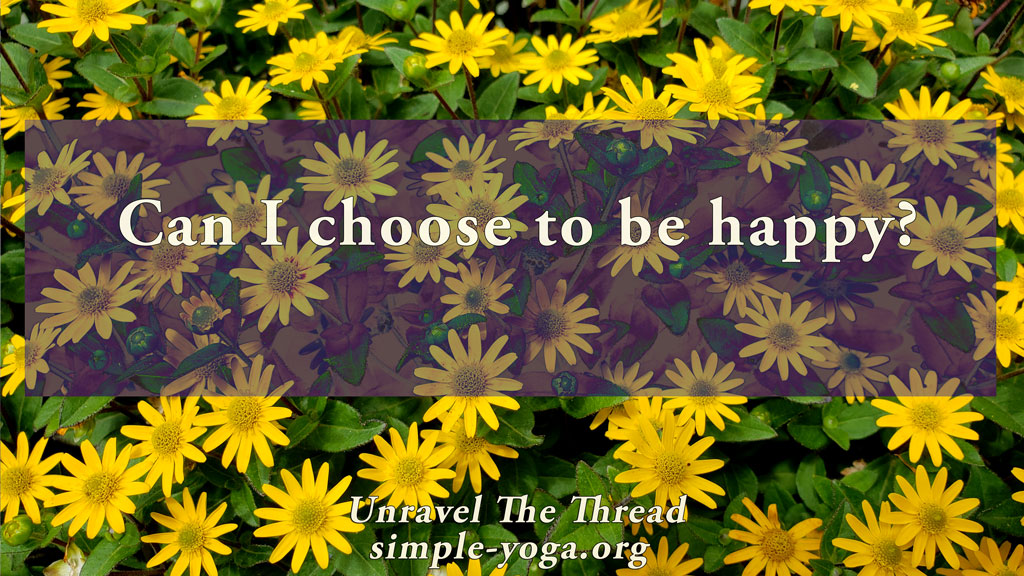
A mantra for presence
June 30, 2024
Could this be your best moment?
July 25, 2024
A mantra for presence
June 30, 2024
Could this be your best moment?
July 25, 2024Can I choose to be happy?

Can I choose to be happy?
We explored earlier the idea that we can choose one comprehensive goal for our lives: Using our awareness for enhancing the quality of our participation in our lives by expressing our uniqueness with kindness and compassion toward ourselves, towards the people around us and toward everything in existence.
One of the reasons for choosing such a comprehensive life goal is that it includes all aspects of our lives while having ways of assessing if we are meeting that goal. There is an implicit assumption in this goal, that fulfilling our fundamental need for unique expression and meaningful connection by embodying kindness and compassion is both desirable and enjoyable.
When we contemplate this overarching goal for our lives, it may become obvious that the simplest expression of that comprehensive goal is that our natural tendencies are guiding us toward recognizing that there is a clear distinction between our experiences and the awareness that witnesses those experiences we are having through the vehicle of our body-senses-mind. Our body, mind and senses may sometimes seem disconnected, yet they are always fully integrated. We experience the world of change through this system (body-senses-mind) and we also learn that this system requires maintenance because it is itself in a constant process of change. Our awareness, however, when it is not clouded by our constant inner chatter, seems to be naturally spacious, non-judgmental, compassionate and kind. In fact, all the pro-social emotions we feel, such as friendship, gratitude, generosity, our willingness to be of service and love are all aspects of the embodied experience of awareness. Fulfilling our fundamental needs and following our two natural tendencies are oriented to being content, satisfied, grateful and happy.
Depending on how we answer the fundamental question “Is the world a place of cooperation or hostile competition?” we may have a number of different perspectives that influence our perceptions, choices, decisions, actions, and interactions. One perspective causes us to perceive that the world is constantly conspiring to make us unhappy and that everything and everyone is trying to make us fail. If this is our perspective, we are more likely to focus on what is not working or what is unsatisfactory in many situations. Could this, in turn, cause us to gravitate toward negativity? If so, it would not be surprising if we hear ourselves generating a lot of complaints wherever we go. It may even seem that everything around us may be conspiring to make us unhappy. Believing that the world is hostile, challenging and difficult, creates biases that influence our perception, intentions, actions and interactions.
As we think about these ideas, it is important to clarify that we are not saying that one should not be discerning. There is a difference between being discerning and complaining. Complaining seems to be a reaction to events in the world not going according to our predictions or expectations. Complaining is generally centered around the identity I have created and the stories that I have made up to support that identity. In other words, complaining is saying, the world does not behave the way I want it to. This is related to suffering as Patañjali mentioned in sutra 2.15. Fortunately for us, Patañjali also explained, in sutra 2.17, what is the cause of suffering and even better; Patañjali told us that future suffering can be avoided in sutra 2.16. Wanting the world to please our changing desires, opinions and beliefs guarantees that we will never be happy. The first perspective, the world is conflict, results in my being suspicious and constantly defensive, which is exhausting, and it keeps us in a constant state of anxiety.
The second perspective, the world is a place of cooperation and connection offers us the possibility that the world is constantly giving us feedback intended to expand our awareness and understanding. This indicates that instead of believing that we already know everything that there is to know, we can be curious to explore intelligently the possibilities in front of us at the unique configuration of events and circumstances that make up the now moment that we are in. Returning to the distinction between discernment and complaining, being in a new moment with clear awareness can show me the shortcoming in my current understanding. It can also indicate to me that something that is happening could be done in a better way. In that case, it is both my right and my responsibility to say or do something to create a more uplifting situation.
While believing that the world is constantly against me creates the conditions for my unhappiness while also giving me the impression that I am both helpless and hopeless, thinking that the world is a play of awareness and that awareness is in a constant process of expansion, invites me to create the possibility that I have agency and that I can, through my deliberate presence, contribute to enhance the quality of awareness wherever I am. This offers us an empirical question, does greater awareness create a greater sense of completeness, interconnectedness and happiness?
We can explore this question by noticing,
- What is my perspective on the world? And how does it influence my ways of perceiving and being in the world?
- When I follow my natural tendency to move toward feeling better and away from feeling pain, does my awareness increase?
- Am I trying to manipulate the world to fit my expectations? Is this making me happy or unhappy?
- When I complain, am I expressing a well thought out response to a particular situation? is my complaint the expression of my dissatisfaction when reality does not meet my predictions or expectations? In either case, how is my complaining useful? In other words, how is what I am saying or doing contributing to uplift the situation?
- Is it possible that friendship, gratitude, generosity, willingness to be of service, and love are all aspects of the embodied experience of awareness?
- Can I choose to be happy?
If you prefer, you may listen to the podcast:
This is an excerpt from the book Unravel the thread: Applying the ancient wisdom of yoga to live a happy life
If you find Simple-Yoga.org and Unravel the thread useful, consider supporting my labor with a donation, you may also donate using PayPal or Venmo. Thank you!
